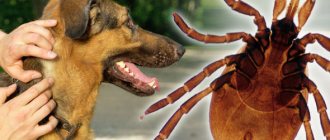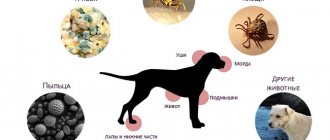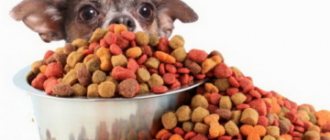Causes
What can cause diarrhea in a Yorkie? Most often, diarrhea is caused by nutritional disorders:
- Wrong diet. These small dogs love to eat and are often omnivores. However, the menu should not include salty, sweet and fried foods. Such food can cause serious poisoning in the animal.
- Poor quality food. When purchasing canned dog food, you need to pay attention to the expiration date of the product. You should also not give your pet cheap dry food of low quality.
- A sudden change in diet. New foods can cause diarrhea in your dog. Yorkies are very sensitive to the composition of their food. Therefore, new foods should be given to them in small quantities, gradually expanding the diet.
- Overeating. The Yorkshire Terrier is a small indoor dog breed. Such animals lead a rather passive lifestyle. Systematic overfeeding can lead to excessive obesity, as well as diarrhea and vomiting in a Yorkie.
In addition, diarrhea may be a sign of the following pathologies:
- Helminthic infestations. Parasites cause inflammation of the gastrointestinal mucosa. In animals this is accompanied by severe diarrhea. In this way, the body tries to get rid of helminths.
- Allergic reactions. Your Yorkie's diarrhea may be due to food allergies. The body of these dogs is quite sensitive to the composition of the food.
- Infectious diseases. Diarrhea is one of the symptoms of viral diseases.
- Non-food poisoning. Sometimes stool disorders in dogs occur after inhaling chemical vapors. In addition, small puppies can swallow inedible objects.
- Acute pancreatitis. Inflammation of the pancreas is usually observed in overweight dogs who are prone to overeating.
It is important to remember that the gastrointestinal tract is a weak point in Yorkshire Terriers. Therefore, it is necessary to monitor your pet’s diet and give your puppy vaccinations on time.
Causes of diarrhea in Yorkies
Causes of diarrhea in Yorkshire Terriers may include:
- Poor nutrition . These breeds have very weak digestive tract organs, so fatty, salty and sweet foods should be excluded from the dog’s diet. Eating such food can lead to stomach upset and impaired intestinal motility.
- Helminthic infestations - the presence of parasites in the intestines causes severe inflammation and damage to the mucous membranes, which is accompanied by severe symptoms of intoxication and loose stools with blood. The source of worms can be poorly processed food or other animals on the street.
- Overeating – Yorkshire Terriers should be carefully monitored for their food intake as they are prone to overeating. Against the background of a large intake of food, the intestines become distended, which leads to severe pain in the abdominal area. The gastrointestinal tract cannot always cope with large volumes of food, as a result of which the intestines try to “get rid” of the load through vomiting and diarrhea.
- Intestinal dysbiosis is one of the common causes of diarrhea in Yorkies. Dysbiosis is associated with a disruption of the natural balance of microorganisms in the intestines as a result of frequent overeating, poor nutrition, prolonged use of medications and digestive disorders in dogs of an infectious nature.
- Food allergies are common in Yorkies due to the high sensitivity of the gastrointestinal tract. It develops rapidly immediately after eating and can lead to severe dehydration. Therefore, when introducing new foods, you should carefully monitor your Yorkie's reaction.
- Change of diet - a sudden change in food can lead to intestinal disorders. To eliminate diarrhea, new foods should be gradually introduced.
- Infectious gastroenteritis . Diarrhea develops several hours or days after bacterial or viral flora enters the pet’s body. The most common pathogens are bacteria (salmonella, E. coli) and viruses (rota-noro-adeno-corona viruses).
General symptoms
Diarrhea in a Yorkie can be a manifestation of various diseases and conditions. Each pathology is accompanied by its own characteristic symptoms. However, there are common signs of diarrhea in this breed of dog:
- frequent and loose stools;
- the presence of mucous impurities in feces;
- refusal to eat;
- extreme thirst due to dehydration;
- vomit;
- lethargy, apathy;
- chills;
- weight loss
Diarrhea without fever and vomiting
If the dog has only loose and frequent stools, but there is no fever or vomiting, then the cause of diarrhea is most often:
- binge eating;
- mild intoxication with low-quality food;
- abrupt introduction of new food to the menu;
- food allergies;
- side effects of drugs.
In this case, it is necessary to reconsider the animal’s diet. Usually, when the diet is normalized, diarrhea disappears. If your dog is taking any medications, you should contact your veterinarian to adjust the treatment regimen.
Mucous bloody diarrhea in animals
Diarrhea (diarrhea) is a clinical problem, which is often characterized by the release of liquid, pasty, watery stool . Depending on the root cause, the stool may contain foam, mucus, undigested food residues, and bloody substances (clots, threads, inclusions).
Diarrhea in animals can be acute , which goes away without any noticeable symptoms, and chronic , which lasts more than two weeks.
If your puppy or dog is diarrhea, it is very important to determine the root cause that caused the stomach upset. Prolonged diarrhea can cause dehydration (dehydration), exhaustion, and electrolyte imbalance in the body.
Important! Prolonged diarrhea is dangerous for small puppies, pregnant and lactating bitches.
In most cases, the nature, color, and consistency of feces can determine the cause of diarrhea in animals.
Black, loose stools with mucus in dogs and other pets indicate the presence of digested blood. The stool appears to have a tar-like consistency. A similar phenomenon occurs due to bleeding in the upper gastrointestinal tract.
bright scarlet blood are noticeable in your pet's stool , this is a symptom of bleeding in the large intestine. The blood is not affected by enzymes and is excreted unchanged in the stool.
If the stool has a normal color, but also contains mucus, foam, and blood , such diarrhea most often occurs due to acute inflammation in the digestive tract.
Diarrhea and vomiting
Very often, diarrhea in Yorkshire Terriers is accompanied by vomiting. This is also usually associated with eating disorders. The body thus strives to get rid of excess food or poor quality food.
In some cases, these symptoms may be caused by inhaling fumes from toxic chemicals. In this case, the dog experiences a sharp deterioration in health and lacrimation. Foam vomiting is usually observed when foreign bodies enter the stomach.
Diarrhea with vomiting is also a sign of worm infection. Parasites can also leave the body during deworming.
Pain in the intestines: causes
Bowel pain can be caused by many reasons. The most common are overeating, poisoning, periodic female pain, intolerance to certain substances (for example, lactose and gluten intolerance are common), as well as diseases of the gastrointestinal tract. If it is not possible to associate the pain with a specific event, for example, with eating stale food, then the cause may be functional disorders of the intestines. The meaning of such violations follows from the name itself - “functional”, i.e. when an organ ceases to perform its intended function in the body. One of the most common functional problems is Irritable Bowel Syndrome (IBS)1.
With Irritable Bowel Syndrome, the motor, or motor, function of the intestines is impaired. We will tell you further how this happens and manifests itself.
For us, food is like fuel for a car. For us to be healthy, food must be well digested and absorbed, saturating the body with useful substances. The intestines play a key role in this process.
Interesting fact: the intestines are always “moving”, even when we sleep! This occurs thanks to smooth muscle cells (SMCs), which are located along and across the intestines. Thus, the intestine has longitudinal and transverse muscle layers.
In a healthy intestine, these two layers work together in a coordinated rhythm. Like any muscle, they alternately contract and relax, which ensures timely movement of food. Under the influence of external factors, the rhythm of the intestines can be disrupted: the muscles contract, but subsequent relaxation does not occur. This condition is called spasm. The spasm is manifested not only by abdominal pain, but also by stool disorders: diarrhea, constipation, as well as bloating2.
How is spasm related to stool disorders and bloating? Intestinal spasm changes and distorts the speed of food movement. When the longitudinal layer of the intestine spasms, diarrhea occurs, and when the transverse layer spasms, constipation occurs. With constipation, intestinal contents “stagnate” in the intestines. As a result, unpleasant fermentation processes occur and gas is released. So, an “irritable” intestine is a spasmodic intestine whose functioning is impaired. “Irritable” intestines manifest themselves as a complex of symptoms: abdominal pain combined with stool problems or bloating2.
Pain, like other symptoms of IBS, appears periodically, often after eating, and subsides after visiting the toilet. The nature of pain is often misleading with its varied manifestations. The abdomen can either expand (which is typical with increased gas formation) or contract. The sensations are aching, burning, and sometimes there are stings and tingling sensations. With IBS, the pain lasts for a long time, from 3 months, and manifests itself mainly in the daytime.
Pain can be quickly relieved with antispasmodics, but until motor function and organ function are restored, significant improvements will be difficult to achieve1,3.
Discharge from nose and eyes
If diarrhea is accompanied by signs of a runny nose and conjunctivitis (discharge from the nose and eyes), as well as high fever, weakness and cough, then this most often indicates viral diseases:
- plague (parvovirus enteritis);
- adenovirus;
- coronavirus;
- rotavirus (“stomach flu”).
Such pathologies most often affect small puppies that have not yet undergone vaccination. In these cases, it is necessary to urgently contact a veterinarian. Many of the above diseases (especially distemper) are deadly for animals. The pet must be hospitalized immediately.
What is conjunctivitis
The disease is manifested by redness and swelling of the eyelids, the appearance of mucus and pus, lacrimation, a burning sensation and itching.
Conjunctivitis is the most common eye disease in the world, accounting for about 30% of all eye pathologies. There are several classifications of this disease, which are based on different signs. The following forms of the disease are distinguished:
- blepharoconjunctivitis - inflammation of both the conjunctiva and the eyelids;
- keratoconjunctivitis - a combination of inflammation of the conjunctiva with inflammation of the cornea;
- episcleritis is a condition in which almost the same tissue damage occurs as with conjunctivitis, but lacrimation and discharge from the eyes are not observed.
Depending on how severe the symptoms of conjunctivitis are and how quickly they develop, there are:
- acute conjunctivitis - the disease is pronounced and causes a lot of inconvenience, reducing the quality of life;
- chronic conjunctivitis - the symptoms of the disease are somewhat erased, but make themselves felt for a long time;
- subacute conjunctivitis - a form that occupies a transitional position between the two mentioned above;
- recurrent - the disease periodically affects the patient's eyes, often around the same time of year.
Bloody or mucous matter
Diarrhea with blood in Yorkies is most often observed with parvovirus enteritis. In this case, there is an admixture of scarlet color in the stool. Reddish discharge is also observed with abdominal injuries. This is a sign of intestinal damage. Such trauma is observed not only when an animal falls, but also when a sharp meat or fish bone is swallowed.
Bloody diarrhea may be a symptom of hemorrhagic leptospirosis. This is a severe bacterial disease that affects the intestines and kidneys. In this case, the dog’s temperature rises sharply, and blood can be seen not only in the stool, but also in the vomit.
With such severe pathologies, the pet needs urgent qualified help. If your dog’s health is rapidly deteriorating, you should call a veterinarian at home.
Diarrhea with mucus in a Yorkie most often indicates a helminthic infestation. It may also be a symptom of pancreatitis or colitis.
Stool color
It is important to pay attention to the color of the feces. Unusual coloring of stool may be a sign of serious pathologies:
- Black feces This color of stool is a formidable sign. Tarry stool is a symptom of bleeding from the stomach or upper intestines due to ulcerative pathologies.
- The stool is white. Discolored stool is released when the bile ducts are blocked. This is accompanied by serious dysfunction of the gastrointestinal tract. Pieces of undigested food can be found in feces.
- Green feces The stool acquires this color in cases of severe poisoning with rotten food. This is a rather dangerous sign that indicates severe intoxication. Typically, the discharge of green feces is always accompanied by severe repeated vomiting.
First aid
If diarrhea is caused by temporary eating disorders or overeating, then the dog’s condition will normalize on its own after changing the diet. In this case, intestinal disorders last no more than a day, and then gradually disappear.
You should immediately contact your veterinarian if the following symptoms occur:
- diarrhea lasting more than 24 hours;
- fever;
- uncontrollable vomiting;
- severe weakness;
- causeless weight loss.
How to provide first aid for diarrhea in a Yorkie? What should you do if your animal suddenly develops diarrhea and feels worse? At the pre-medical stage, it is necessary to stop giving the dog food. Before contacting a veterinarian, a sick pet can only be given clean water to drink to prevent dehydration.
What to give your Yorkie for diarrhea? In such cases, you should not self-medicate. At the pre-medical stage, you can give your dog only enterosorbents: “Activated carbon”, “Smecta”, “Polysorb”, “Enterosgel”. These drugs will cleanse the animal's stomach of toxins. All other types of medications can only be prescribed by a specialist. Therefore, it is necessary to seek veterinary help as soon as possible.
Diagnostics
Only a veterinarian can determine the exact cause of diarrhea. The pet must undergo the following diagnostic examinations:
- stool analysis for helminth eggs and bacteria;
- general clinical blood test;
- blood test for biochemical parameters;
- serological tests for viral infections.
If gastrointestinal diseases are suspected, an x-ray and ultrasound examination of the abdominal cavity are prescribed.
Treatment methods
The choice of treatment for diarrhea in your Yorkie depends on the cause of the diarrhea. If stool disorder is caused by improper nutrition, then it is enough to change the pet’s diet. In more complex cases, drug therapy is necessary:
- In case of poisoning, the animal is recommended to take enterosorbents. If your Yorkie is severely dehydrated, infusion treatment with saline solutions is necessary.
- For viral diseases, special serums with antibodies are administered. Taking immunomodulators is also indicated. These drugs help the body fight infection.
- For bacterial and protozoal pathologies, the antibiotic Levomycetin, as well as the antiseptics Furazolidone and Enterofuril, are prescribed.
- If diarrhea is accompanied by severe abdominal pain, then taking antispasmodics is indicated: “Papaverine”, “Nosh-py”.
Veterinarians strictly prohibit giving Yorkies the human anti-diarrhea drug Loperamide. This medication is extremely dangerous for small breed dogs and may cause gastrointestinal bleeding.
Symptoms
Diarrhea in a Yorkie is a symptom of serious disorders in the functioning of the digestive tract, which can be recognized by an increase in the number of bowel movements, as well as the liquid consistency of the stool.
Along with loose stools, your pet may experience pain and rumbling in the abdomen, nausea and vomiting, and elevated body temperature. The dog's condition worsens, appetite decreases or completely disappears. The pet is rapidly losing weight. Some intestinal pathologies with diarrhea, such as plague or worms, may be accompanied by increased discharge from the eyes and nose.
By the color of stool, you can determine the cause that led to intestinal disorders. This symptom is very important when making a diagnosis and prescribing treatment.
Green loose stool
Green diarrhea of light and dark shades with a sharp sour odor indicates fermentation processes in the body, which are caused by the consumption of low-quality food or the proliferation of bacteria in the Yorkie's gastrointestinal tract.
Typically, green diarrhea is profuse and quickly leads to dehydration. Therefore, it is necessary to immediately contact a veterinarian to take measures to restore water and electrolyte balance and normalize intestinal motility.
White diarrhea
If your Yorkie has white diarrhea, you should immediately contact a veterinary clinic, as this is a symptom of blockage of the bile ducts, as a result of which bile does not enter the intestines in sufficient quantities. The problem can usually be solved through surgery.
Diet
For diarrhea, Yorkies are prescribed a strict diet. Veterinarians recommend not feeding your dog on the first day after the onset of the disease. However, you should give your pet as much water as possible. After all, with diarrhea and vomiting, the body loses a lot of fluid.
In the following days, you can give the animal the following foods:
- rice cooked in water;
- boiled chicken breast without skin;
- boiled potatoes;
- skim cheese.
It is strictly forbidden to feed a sick dog the following food:
- raw meat;
- fried foods;
- sweets;
- fatty meat products and pork.
This diet must be followed until the diarrhea stops completely. In the future, the Yorkie's diet is gradually expanded.
Methods for treating indigestion in Yorkie puppies
Experts do not recommend feeding your dog on the first day of diarrhea. Eating food will only worsen the symptoms of diarrhea. To prevent dehydration, it is necessary to provide your dog with unlimited access to clean water. Choosing a treatment method requires special research.
When infected with viruses, hyperimmune serums are used. They contain antibodies that help the animal get rid of the infection.
To destroy harmful bacteria, the doctor prescribes antibiotics. Dysbiosis can be cured with the help of probiotics.
To relieve symptoms of intoxication in case of poisoning, adsorbents (Enterosgel, Smecta) are used. If intestinal spasms occur, it is necessary to add Papaverine to the puppy’s food.
Intense diarrhea leads to rapid dehydration. IVs are used to treat such dogs.
Prevention
How to prevent bowel disorders in Yorkshire Terriers? Veterinarians advise adhering to the following recommendations:
- Do not overfeed the dog.
- Monitor your pet's weight and prevent obesity.
- Give the animal only high-quality food.
- Eliminate fried and fatty foods, as well as raw meat and sweets from your diet.
- Protect your dog from exposure to chemicals and allergens.
- Timely vaccinate the puppy and carry out anthelmintic therapy.
- Take your dog to the veterinarian regularly to prevent internal diseases.
Compliance with these measures will help to avoid many dangerous pathologies accompanied by diarrhea.











